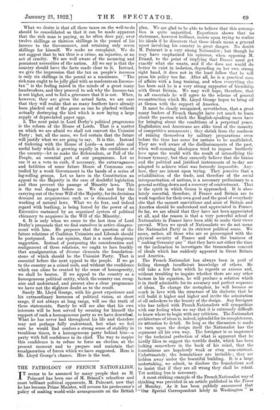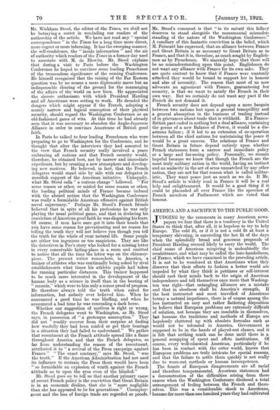THE PATHOLOGY OF FRENCH NATIONALISM.
IT seems' to be assumed by many people that as M. Poincare has been one of M. Briand's relentless and most brilliant political opponents, M. Poincar4, now that he has become Prime Minister, will reverse his predecessor's policy of making world-wide arrangements on the British plan. We are glad to be able to believe that this assump- tion is quite unjustified. Experience shows that no statesman, however brilliant, insists upon trying to realize his ideals if he discovers that those ideals mean a general upset involving his country in great danger. No doubt M. Pomcare is a very strong Nationalist ; but though he may have emphasized his opinions, when opposing M. Briand, to the point of implying that France must get exactly what she wants, and if she does not would do better to exist in isolation, depending on her own strong right hand, it does not in the least follow that he will press his policy too far. After all, he is a practical man of affairs with a long training, and when everything else has been said he is a very strong supporter of friendship with Great Britain. We may well hope, therefore, that in all essentials he will agree to the scheme of general reconstruction which Mr. Lloyd George hopes to bring off at Genoa with the support of America. It must be clearly recognized, nevertheless, that a great many leaders of French thought have yet much to learn about the passion which the English-speaking races have for bringing about the conditions of a perpetual peace. Englishmen and Americans are alike tired of the insanity of competitive armaments ; they shrink from the madness of ruining themselves by military preparations even before the time has come for nations to be annihilated. They are well aware of the disillusionments of the past, when well-meaning ideologues tried to impose brotherly love upon the world with the result of intensifying the former tyranny, but they earnestly believe that the brains and the political and juridical instruments of to-day are adapted to achieve what was formerly impossible. Any- how, they are intent upon trying. They perceive that a rehabilitation of the trade, and therefore of the social interpenetration of nations, is a necessary preliminary to a general settling down and a recovery of contentment. That is the spirit in which Genoa is approached. It is abso- lutely essential, therefore, if France and Britain are to work together for their own good and the good of everybody else that the earnest convictions and aims of Britain and America should be understood and appreciated in France. So far, we are afraid that they have not been appreciated at all, and the reason is that a very powerful school of Nationalists in France have been able to make their views prevail. When we speak of Nationalists we do not mean the Nationalist Party in its strictest political sense. We mean, rather, all those who are so preoccupied with the physical security of France and with the business of making Germany pay " that they have not either the time or the inclination to investigate the tremendous concord of ideals which has suddenly appeared in Great Britain and America.
The French Nationalist has always been in peril of failing through insufficient knowledge of others. He will take a few facts which he regards as axioms and, without troubling to inquire whether there are any other factors in his equation, he will produce a solution which is in itself admirable for its accuracy and perfect sequence of ideas. To change the metaphor, he will become so much in love with the structure of his dialectic that he will build it higher and higher and invite the admiration of all onlookers to the beauty of the design. Any foreigner who has talked with French Nationalists will sympathize with our feeling when we say that it is extremely difficult to know where to begin with any criticism. The Nationalist architecture of ideas is, indeed, splendid for its completeness, its attention to detail. So long as the discussion is made to turn upon the design itself the Nationalist has the argument all his own way. The foreigner is so impressed by the technical perfection of what is apparent that he hardly likes to suggest the terrible doubt, which has been lurking somewhere in the back of his mind, that the foundations are hopelessly weak or even non-existent. Unfortunately, the foundations are invisible ; they are hidden away under the beautiful building. It is a large undertaking, we admit, to disclose the foundations said to insist that if they are all wrong they shall be relax'. Yet nothing less .is necessary. A most striking example of the French Nationalist way of thinking was provided in an article published in the Times of Monday. As it has been publicly announced that " Our Special Correspondent lately in Washington Is Mr. Wickham Steed, the editor of the Times, we shall not be betraying a secret in reminding our readers of the authorship of the article. We have not read any " special correspondence " in the Times for a long time more direct, more cogent or more informing. It has the sweeping manner, the self-confidence, the " inside information " and the air of authority which readers of the Times in a former day used to associate with M. de Blowitz. Mr. Steed explains that during a visit to Paris before the Washington Conference he hoped to convince some leading Frenchmen of the tremendous significance of the coming Conference. He himself recognised that the raising of the Far Eastern question was by no means a mere diplomatic move but an indispensable clearing of the ground for the rearranging of the affairs of the world on new lines. He appreciated the sincere enthusiasm with which President Harding and all Americans were setting to work. He dreaded the dangers which might appear if the French, adopting a merely narrow and logical conception of their physical security, should regard the Washington Conference as an old-fashioned game of wits. At this time he had already seen that it was necessary to abandon the Anglo-Japanese Alliance in order to convince Americans of British good faith.
In Paris he talked to four leading Frenchmen who were preparing to go to Washington for the Conference, and he thought that after the interviews they had assented to the view that French security really involved a peace embracing all nations and that French security would, therefore, be obtained best, not by narrow and immediate expedients, but by creating a new atmosphere and develop- ing new motives. He believed, in fact, that the French delegates would stand side by side with our delegates in unselfish support of the American initiative. Unhappily, what Mr. Steed calls " a curious change " followed. " For some reason or other, or misled for some reason or other, the leading political minds of France became imbued with the absurd notion that the Washington Conference was really a formidable American offensive against British naval supremacy." Perhaps Mr. Steed's French friends believed that in spite of all his professions he was only playing the usual political game, and that in declaring his conviction of American good faith he was disguising his fears. Of course, if men have once got it into their heads that you have some reason for prevaricating and no reason for telling the truth they will not believe you though you tell the truth for the whole of your natural life. Some people are either too ingenious or too suspicious. They are like the detectives in Poe's story who looked for a missing letter in every conceivable hiding-place in a room and omitted to notice that all the time the letter was on the chimney- piece. The present writer remembers, in America, a trainer of athletes who was continually being asked by rival establishments what times his athletic pupils had taken for running particular distances. This trainer happened to be much more interested in the development of the human body as a science in itself than in the beating of " records," which were to him only a minor proof of progress. He therefore always told the truth when asked for information, but nobody ever believed him. When he announced a good time he was bluffing, and when he announced a bad time he was concealing a dark horse. Whether our suggestion of motives is right or wrong, the French delegates went to Washington, as Mr. Steed says, in possession of " a grotesque assumption." They did not possession readily recover from their surprise at finding how woefully they had been misled or get their bearings in a situation they had failed to understand." We gather that resentment at the French attitude spread like a flame throughout America and that the French delegates, so far from understanding the reason of the resentment, attributed it to " a revival of the Press campaign against France." " The exact contrary," says Mr. Steed, " was the truth." If the American Administration had not used its influence to restrain the Press there would have been " so formidable an explosion of wrath against the French attitude as to open the eyes even of the blinded." Mr. Steed goes on to tell us that another primary cause of recent French policy is the conviction that Great Britain is in an economic decline, that she is " more negligible than she has appeared to be for generations?' Unemploy- ment and the loss of foreign trade are regarded as proofs. Mr. Steed's comment is that " in its naivete this fallacy deserves to stand alongside the monumental misunder- standing of the nature of the Washington. Conference." A corollary of this fantastic conviction is the belief, which M. Poincare has expressed, that an alliance between France and. Great Britain is as necessary to Great Britain as to France, and that it is, therefore, as much sought by English- men as by Frenchmen. We sincerely hope that there will be no misunderstanding upon this point. Englishmen do not want any affiance with France for its own sake. They are quite content to know that if France were wantonly attacked they would be bound to support her in honour and also of necessity. The reason that most of us now advocate an agreement with France, guaranteeing her security, is that we want to satisfy the French in their own way. But we certainly do not want any pact if the French do not demand it.
French security does not depend upon a mere bargain between two nations but upon a general tranquillity and a general absorption in the business of trading instead of in grievances about trade that is withheld. If a Franco- British pact ended in nothing but a dual alliance, containing the germs of a new Balance of Power, it would be a dis- astrous failure ; if it led to an extension of co-operation between all the chief nations for maintaining the peace it would be a great success. The relations of France and Great Britain in future depend entirely upon whether French statesmen form a narrow and immediate policy or a large and far-seeing policy. Personally, we remain hopeful because we know that though the French are the most truly military nation in the world, having an instinct and an audacity in the art of arms unmatched by any other nation, they are not for that reason what is called militar- istic. They want peace just as much as we do. If Mr. Steed's article is widely read in France it will be a real help and enlightenment. It would be a good thing if it could be placarded all over France like the speeches of French members of Parliament which are voted that honour.



































 Previous page
Previous page